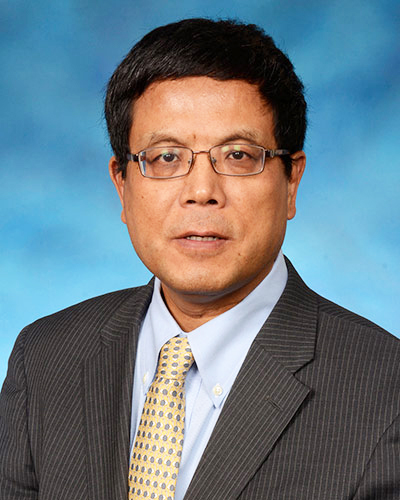Exploring Innovative Rehabilitation Strategies
Researchers at the University of Maryland School of Medicine (UMSOM) have received a $4.6 million federal grant to study rehabilitation strategies and determine the best course of action to help restore mobility and function to patients who suffer from debilitating strokes and other neurological conditions. The grant was awarded by the National Institute on Disability, Independent Living, and Rehabilitation Research.
“We plan to investigate how rehabilitation outcomes can be improved, based on accurate assessment of impairment, decreased mobility, and increased risk of falls following strokes or due to aging,” said project director Li-Qun Zhang, PhD, professor of physical therapy and rehabilitation science, and professor of orthopaedics at UMSOM. “The goal is to improve therapeutic outcomes by developing and testing assessment-based rehabilitation, carried out beyond hospitals and clinics to reach the patient at home.”

Li-Qun Zhang, PhD
The grant will address the similar impairments observed in patients following a stroke or associated with aging. The researchers will use advanced rehabilitation robotics and machine learning technology to make more specific assessments and tailor therapy to the individual patient’s unique needs. They plan to investigate how neurological impairments contribute to decreased mobility, slow and asymmetric gait post-stroke, reduced balance, and increased risk of falls.
To accomplish these goals, the researchers plan to implement impairment-specific therapeutic training, based on novel assessments of impairments using new technologies. Neurological deficiencies that will be assessed and treated include muscle weakness in the lower extremities, poor coordination, lack of posture and balance control, lack of walking, and stair climbing abilities. The team will also assess upper-body impairments like arm and hand control and the ability to grasp objects by applying new technologies and muscle-specific robotic treatments, eventually translating to improved function and mobility that are necessary for daily living. More than 250 patients will be recruited for these studies.
The five-year grant also includes participation of researchers at University of Maryland, College Park; University of Maryland, Baltimore County; Catholic University of America; National Rehabilitation Hospital; University of Texas Health Science Center at Houston; and Baltimore VA Medical Center.
The group has formed a federally recognized Rehabilitation Engineering Research Center (RERC) program, with the goal of conducting research to improve the effectiveness of services authorized under the Rehabilitation Act. They conduct advanced engineering research and develop innovative technologies designed to solve particular rehabilitation problems or remove environmental barriers.
“We will implement focused therapeutic training based on accurate quantitative multi-level assessments of impairments,” said Zhang.
Added Victoria Marchese, PhD, PT, chair of the Department of Physical Therapy and Rehabilitation Science at UMSOM, “I am so pleased that we are about to launch this exciting research study, in particular Dr. Zhang’s efforts to train a new generation of clinicians and engineers to work with the latest rehabilitation technology.”
Assessing complex, post-stroke impairments or fall risks in aging is challenging and involves multiple joints, multiple degrees of freedom at each joint, and bilateral involvements, which are not feasible to do in current clinical practice. The researchers seek to address this challenge by developing multiple joint, multiple limb, robot-guided assessment, and impairment-specific therapies that can target specific disabilities to objectively measure whether interventions are working. They also hope to translate this knowledge to better guide clinicians in establishing treatment plans that combine in-clinic therapy with at-home treatments.
“Innovation and research that help patients lead better lives is at the center of our mission,” said E. Albert Reece, MD, PhD, MBA, executive vice president for medical affairs, University of Maryland, Baltimore, and the John Z. and Akiko K. Bowers Distinguished Professor and UMSOM dean. "Studies such as these can have real clinical implications in helping patients recover from strokes and other debilitating neurological conditions, so they can lead more functional, healthier lives.”



